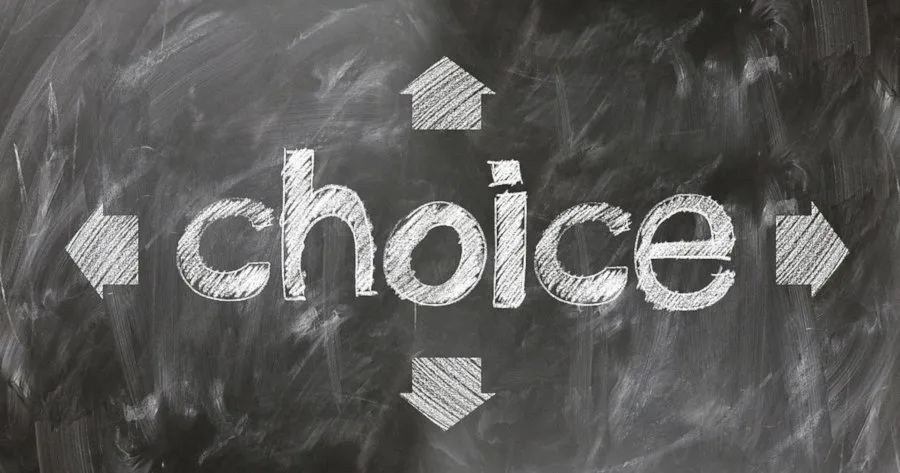One of the most deeply rooted dogma's by which we lead our lives is this mantra of the free market economy: Individual freedom is paramount and more options to choose from, maximizes this individual freedom. This is just another myth that badly needs some debunking..

source: Wikimedia Commons
Freedom means we act on our own and that we make our own choices, so increasing the number of available choices empowers individuals to choose exactly what they want. Individual freedom and independence are economic lies we'll tackle some other time, but this one about freedom and choices is one we all suffer from.
While it is clear that having some choice is good, I would like to use Barry Schwartz' book "The Paradox of Choice: Why More Is Less", or what I can remember from it, to explain why too much choice hurts us. He uses the example of a typical supermarket: we can choose from row after row of shampoos, more than 200 soups, almost 300 varieties of cookies, 175 different salad dressings... and so on. Apart from the fact that a lot of that gets wasted because it's never sold, nor transported to poorer people, all this choice has some sneaky and very negative effects on us.
First, too much options causes choice paralysis: we can't decide what to choose and eventually give up. Not only in the supermarket: research has been done with employers that give different options for pension-plans. For every 10 different plans that were offered, participation went down; when you offer 50 plans, 10% less people participate than when you offer only 5 plans. There's so much to choose that you keep postponing and eventually never com back around to it.
The more choices we have, the LESS choices we actually end up making!
source: Science of People
And if we're not totally paralyzed and do make a choice out of the many, we're confronted with the next downside of all this freedom: we are always less satisfied with our eventual choice than we would have been if there was far less or no choice. This is because with a sea of choices it's very easy to imagine that you didn't make the perfect choice. The jeans you chose looks and fits wonderful, but did you try them all? It's good, ,but not perfect, almost certainly not the best choice you could have made.
Then there's the responsibility. If there's only one type of jeans and it doesn't fit perfectly, you can blame the manufacturer. But with all that choice, it's you that made the wrong choice, you are to blame. This freedom of choice dogma has reached absurd heights in medicine. When we used to visit the doctor with some ailment, the doctor said "this is what's wrong and this is what we'll do about it." Nowadays it goes like this: "You have this ailment... And we could do treatment A, which has these benefits and these side-effects, or we could do treatment B, which has those benefits and those side-effects", and usually they both have a different price-tag...
This shifts the responsibility of a rather important choice from the one that knows something about it, the doctor, to someone who knows nothing about it and is sick on top of that, and therefore maybe not qualified to make any decision at all. You see this in the enormous amount of marketing of prescription-drugs. Why would they advertise this when they can't sell it directly to you? It's because Big Pharma expects you to make use of your freedom and call your doctor to change your prescription: you decide, and they will suck every dollar out of your pockets with every decision you make.
In our modern lives we are under a constant barrage of choices: should I answer the mobile, the email or not? When should I get married and should I have kids and if yes, when? We can even choose if we want our bodies to match our gender-identity: even our physical body has become a matter of choice. All these choices, for the most part manufactured, are often the opposite of freedom and take away energy we could be spending on choices and decisions and questions that really matter, like the last one about our bodies I just mentioned.
“The alternative to maximizing is to be a satisficer. To satisfice is to settle for something that is good enough and not worry about the possibility that there might be something better.”
? Barry Schwartz, The Paradox of Choice: Why More Is Less
The paradox of choice | Barry Schwartz
Thanks so much for visiting my blog and reading my posts dear reader, I appreciate that a lot :-) If you like my content, please consider leaving a comment, upvote or resteem. I'll be back here tomorrow and sincerely hope you'll join me. Until then, keep safe, keep healthy!

Recent articles you might be interested in:

Thanks for stopping by and reading. If you really liked this content, if you disagree (or if you do agree), please leave a comment. Of course, upvotes, follows, resteems are all greatly appreciated, but nothing brings me and you more growth than sharing our ideas.
